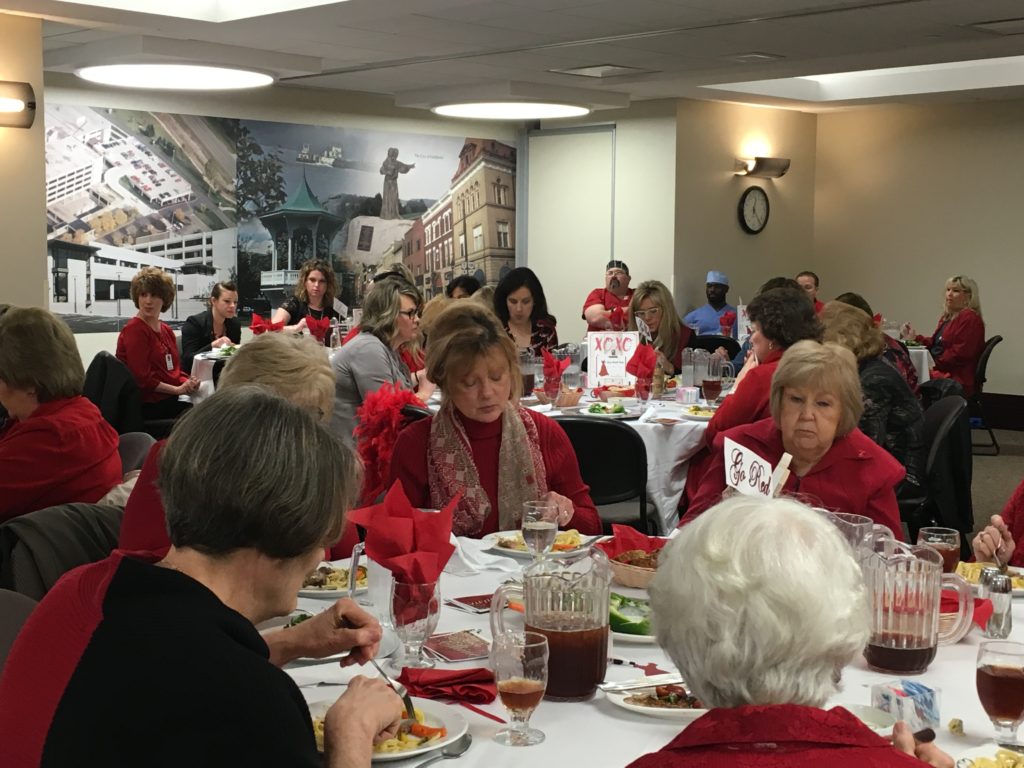Holzer holds Fifth Annual Go Red for Women Heart Luncheon

GALLIPOLIS – Holzer recently held its Fifth Annual Go Red for Women Heart Luncheon in recognition of February as American Heart Month. This year’s guest panel included Lori Cremeans, RN MSN CRRN CWOCN, Director Cardiovascular and Pulmonary Services, Holzer, Diana Shillington, Special Guest Panel Member, Sarah Ramsburg, RDN, LD, Clinical Dietitian, Holzer, Darren Hayes, Exercise Physiologist, Holzer, Jennifer Spradlin, RN, Cardiac Registry, Holzer, Ramesh Chandra, MD, Interventional Cardiologist, Holzer, and Robert Hess, MD, Emergency Services, Holzer.
A variety of heart health information was provided for those in attendance, including: signs and symptoms of a heart attack, when to go to the emergency room, nutrition for optimal heart health, what to expect in cardiac rehabilitation programs, and when to start looking at individual risk factors and establishing a relationship with a primary care provider. “It’s important for women to know their family history and start taking care of ourselves at an early age. We suggest women start knowing their cholesterol and health numbers at 25 years old,” stated Spradlin. “We must educate ourselves to not only recognize the symptoms of heart issues in our loved ones, but also ourselves. The more educated we are about heart health and when to seek assistance from health professionals, the better we will be.”
The American Heart Association provides the follow symptoms for women to be aware of:
- Chest Discomfort – Most heart attacks involve discomfort in the center of the chest that lasts more than a few minutes, or that goes away and comes back. It can feel like uncomfortable pressure, squeezing, fullness, or pain.
- Discomfort in other Areas of the Upper Body – Symptoms can include pain or discomfort in one or both arms, the back, neck, jaw or stomach.
- Shortness of breath – with or without chest discomfort.
- Other signs – May include breaking out in a cold sweat, nausea, or lightheadedness.
- If you experience any of these symptoms, call 911.
“There is a variety of online tools and screening resources available to gauge risk of heart disease,” stated Dr. Chandra. “We encourage everyone to talk to their primary care provider about his/her individual risk for developing cardiovascular problems. We want everyone to have the very best heart health possible.”
“Holzer has established wonderful relationships with our local emergency medical services personnel, and based on information provided by the EMS, we are able to call cardiovascular specialists in prior to the arrival of the ambulance if necessary,” continued Spradlin. “Our door to balloon time is better than national standards, providing our patients with the heart care needed in record time.”
“We encourage everyone to take their symptoms seriously,” stated Dr. Hess. “We would much rather have someone present to the emergency room to be sure that everything is okay, rather than have an individual ignore symptoms and end up with something more serious.”
For more information on this year’s event, visit www.holzer.org.






